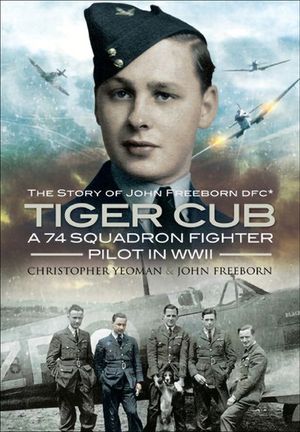Tiger Cub
John Freeborn Follow this author
Follow this author
Published by Pen & Sword Books
The stirring biography of the RAF flying ace, one of the great pilots of the Battle of Britain, and the famous squadron that catapulted him into history.
Acting Pilot Officer John Freeborn reported to RAF Hornchurch on 29 October, 1938. John was posted from Flying Training School to join the already acclaimed 74 “Tiger” Squadron at eighteen years of age. At that time the Squadron was equipped with the Gloster Gauntlet. One of the first people John met when he arrived at the station was Bob Stanford Tuck of 65 squadron. On first meeting South African fighter ace Adolf “Sailor” Malan, John thought he seemed nice enough and soon learned that he was a determined leader, a fine flyer and an aggressive fighter pilot. “He was definitely the best shot there was,” John recalls. “Without question Malan was a brilliant marksman, but I could out fly him and I bloody told him so too."
John flew many operations with 74 Squadron in Spitfires during the early years of the war and the Battle of Britain; he was awarded the DFC for his efforts.
During a brief respite for 74, John Freeborn was promoted to Flight Lieutenant and on 29 August he was given command of A Flight. In 1941, the first couple of months saw 74 Squadron conducting fighter Sweeps and Circus sorties over the French coast. On 17 February 1941, John Freeborn learned that he had been awarded a bar to his DFC. At that time, he had destroyed twelve enemy aircraft and damaged many more.
In 1946 John Connell Freeborn DFC and Bar left the Royal Air Force with honor and distinction.
Acting Pilot Officer John Freeborn reported to RAF Hornchurch on 29 October, 1938. John was posted from Flying Training School to join the already acclaimed 74 “Tiger” Squadron at eighteen years of age. At that time the Squadron was equipped with the Gloster Gauntlet. One of the first people John met when he arrived at the station was Bob Stanford Tuck of 65 squadron. On first meeting South African fighter ace Adolf “Sailor” Malan, John thought he seemed nice enough and soon learned that he was a determined leader, a fine flyer and an aggressive fighter pilot. “He was definitely the best shot there was,” John recalls. “Without question Malan was a brilliant marksman, but I could out fly him and I bloody told him so too."
John flew many operations with 74 Squadron in Spitfires during the early years of the war and the Battle of Britain; he was awarded the DFC for his efforts.
During a brief respite for 74, John Freeborn was promoted to Flight Lieutenant and on 29 August he was given command of A Flight. In 1941, the first couple of months saw 74 Squadron conducting fighter Sweeps and Circus sorties over the French coast. On 17 February 1941, John Freeborn learned that he had been awarded a bar to his DFC. At that time, he had destroyed twelve enemy aircraft and damaged many more.
In 1946 John Connell Freeborn DFC and Bar left the Royal Air Force with honor and distinction.
BUY NOW FROM
COMMUNITY REVIEWS

